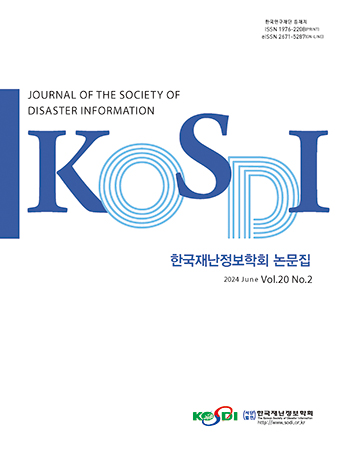Original Article
Abstract
References
Information
Purpose: Earthquake disasters are frequently occur unpredictable situations due to various variables and unexpected situations. As a result, the work process itself is not uniform, making it difficult for public officials in the disaster safety department to familiarize themselves with the earthquake field manual. This paper is specifically and accurately grasp the current work situation conducted by the Disaster and Safety Countermeasures Headquarters of the Gyeongsangbuk-do Office and present a plan for designing serious game scenarios necessary for field manual learning. Method: In this study, scenarios were designed based on the GBS(Goal Based Scenario) model, and in the process of assigning missions and roles based on the Gyeongsangbuk-do earthquake field manual, public officials related to earthquakes were able to acquire knowledge and skills to solve practical tasks. Result: Scenario data of the proposed technique was implemented as a systematic procedure by processing various earthquake-related information into logical data and simplifying and abstracting it for game expression for earthquake situation training. Conclusion: In the event of an earthquake due to learning through serious games, related public officials of Gyeongsangbuk-do provincial are expected to be able to respond quickly to various earthquake disasters.
연구목적: 지진재난은 다양한 변수와 돌발상황들로 예측할 수 없는 상황이 빈번하게 발생하게 때문에 업무과정 자체가 일률적이지 못해 재난안전부서 공무원들은 지진 대응 행동 매뉴얼 숙지에 어려움을 겪고 있다. 이에 본 연구는 경상북도청 재난안전대책본부에 한하여 이루어지고 있는 현재의 업무 상황을 구체적이고 정확하게 파악하여 업무 진행 과정에 필요한 매뉴얼 학습의 시리어스 게임 시나리오 설계방안을 제시하고자 한다. 연구방법: 본 연구에서는 GBS(Goal Based Scenarios)모형을 기반으로 시나리오를 설계하고, 경상북도 재난 현장조치 행동 매뉴얼을 기반으로 미션과 역할을 부여하는 과정에서 경상북도청 지진관련 공무원들이 실제적인 과제를 해결하는 지식과 기능을 습득할 수 있도록 하였다. 연구결과: 제안된 기법의 시나리오 데이터는 지진관련 다양한 정보를 논리적 데이터로 가공하여 지진상황 훈련을 위한 게임상 표현을 위하여 단순화, 추상화하여 체계적인 절차로 구현하였다. 결론: 시리어스 게임을 통한 학습으로 지진 상황 발생 시, 경상북도청 재난안전대책본부의 관련 공무원들은 다양한 지진재난에 신속한 대응이 가능할 것으로 기대된다.
- Cho, K.L., Cho, Y.H., Kim, M., Sung, B. (2004). "Design and development of WBI contents: A Goal-based Scenarios (GBS) model approach." The Journal of Korean Association of Computer Education, Vol. 7, No. 5, pp. 9-21.
- Clark, C.A. (1987). Serious Games. University Press of America, USA.
- Gyeongsangbuk-do (2017). Earthquake, Tsunami Disaster Field Manual. Gyeongsangbuk-do, Republic of Korea.
- Gyeongsangbuk-do District (2018). Gyeongsangbuk-do Earthquake and Tsunami Field Manual. Republic of Korea.
- Kahn, H. (2009). On Escalation: Metaphors and scenarios(Vol. 1). Transaction Publishers, New Brunswick & London, U.S.A & U.K.
- Kudo, J., Inakage, M. (2017). "DPVR" Proposal of Disaster Education Content Using Serious Game from the Experience of the Great East Japan Earthquake. Master's Thesis, Keio University, Tokyo.
- Lee, S.S. (2017). "Analysis of social issues of the newspaper articles on Gyeongju earthquakes." Journal of Korean Library and Information Science Society, Vol. 48, No. 2, pp. 53-72. 10.16981/kliss.48.2.201706.53
- Roubelat, F. (2000). "Scenario planning as a networking process." Technological Forecasting and Social Change, Vol. 65, No.1, pp. 99-112. 10.1016/S0040-1625(99)00125-0
- Weichselgartner, J. (2001). "Disaster mitigation: The concept of vulnerability revisited." An International Journal, Vol. 10, No. 2, pp. 85-94. 10.1108/09653560110388609
- Won, J.S, Kim, S.G. (2016). A Study of Developing Disasters and Incidents Scenarios Based on Emergency Responses. The Seoul Institute, 2016-BR-23, Republic of Korea.
- Publisher :The Korean Society of Disaster Information
- Publisher(Ko) :한국재난정보학회
- Journal Title :Journal of the Society of Disaster Information
- Journal Title(Ko) :한국재난정보학회논문집
- Volume : 17
- No :4
- Pages :769-777
- DOI :https://doi.org/10.15683/kosdi.2021.12.31.769




 Journal of the Society of Disaster Information
Journal of the Society of Disaster Information







